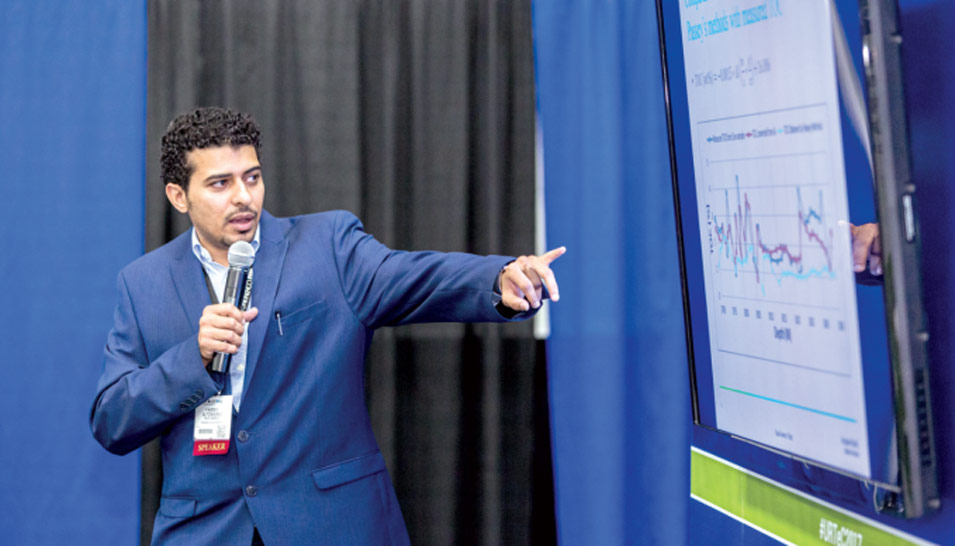
Yazeed K. Altowairqi presented a case study paper using rock physics modeling to identify high total organic carbon shale in Perth Basin, Western Australia. Altowairqi works in Saudi Aramco’s Emerging Unconventional Assets Department and is applying his work to the Jafurah Basin in Saudi Arabia.
For a fifth straight year, Aramco participated in North America’s Unconventional Resources Technology Conference (URTeC) with an eye toward learning and sharing its proficiency in optimizing production from unconventional resources — namely shale and tight gas.
Aramco has added an international dimension to URTeC since the conference debuted in 2013. Upstream staff members have served on the technical program committee since the beginning, helping to build the conference’s reputation for high-impact research and development.
This year, upstream professionals and researchers from Houston and Dhahran were integrally involved throughout the three-day conference by chairing technical sessions, participating in panel discussions, and presenting papers.
Showcasing Hydraulic Fracturing, Fluid Chemistries and Geomechanics

Professionals from the Aramco Services
Company (ASC) Upstream team based in
Houston meet with geophysicists and
petroleum engineers from the Emerging
Unconventional Assets Department in
Dhahran during URTeC.
For Aramco, the development of new approaches and techniques in hydraulic fracturing, fluid chemistries, and geomechanics has advanced the company’s knowledge and competitiveness in extracting unconventional gas in a relatively short time. As part of an ambitious domestic gas production plan seeking to double gas output over the next decade, to 23 billion standard cubic feet per day, gas sourced from shale formations is an important contributor to meet in-Kingdom energy demands.
New methods and technologies developed by our Houston Research Center and the Upstream group were shared in the areas of geomechanics, well completion, and stimulation practices as well as overall strategies for increasing production from unconventional wells.
Sessions were co-chaired by Houston Upstream professionals Theo Mallinson and Gang Han. To a standing room only crowd, Mallinson introduced the topic of mining big data in the session “Analytics and the Digital Oil Field” and Han, who specializes in geomechanics, co-chaired a session “Geomechanics II: In Situ Stresses, Stress Shadow and Microseismics.” Han also provided the keynote for the first American Rock Mechanics Association session “Hydraulic Fracturing Community and Model Runoff,” highlighting the work of the organization’s Technical Committee on hydraulic fracturing and its advancement of fundamental physics in fracturing.

Anupam Singh from the Saudi Aramco
Energy Ventures North American team joins
panelists from national labs and institutes
discussing innovation in the oil and gas
industry.
Joining panelists from national labs and institutes discussing new ways to look for technology outside of the oil and gas industry was Anupam Singh, Saudi Aramco Energy Ventures, in “Shopping for New Ideas from Unconventional Sources.” As a member of the North American team for Aramco’s corporate venture capital fund, Singh looks to identify and invest in new technologies of strategic importance to Aramco and the Kingdom. This well attended session spoke to the heart of innovation — a characteristic of unconventional operators since the shale revolution began.
The closing day topical breakfast presentation by Dan Georgi, Reservoir Engineering team lead, Houston Research Center, on “Aramco Research in Support of Unconventionals” was sold out as attendees were eager to hear about the advances being made by the company.
Aramco was a diamond level sponsor of the conference, which is a collaborative effort by three scientific and professional societies: the Society of Petroleum Engineers (SPE), American Association of Petroleum Geologists (AAPG), and the Society of Exploration Geophysicists (SEG).